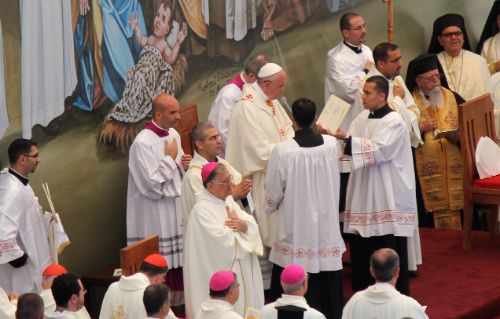In his homily delivered in Bethlehem this morning, Pope Francis meditated on the role of the Christ child in the life of every person. “The child Jesus, born in Bethlehem, every child who is born and grows up in every part of our world, is a diagnostic sign indicating the state of health of our families, our communities, our nation,” the Pope preached on May 25 in Manger Square in Bethlehem. “And we have to ask ourselves: who are we, as we stand before the child Jesus? Who are we, standing as we stand before today’s children?” Celebrating mass on the site of Jesus’ birth, Pope Francis delivered strong words in condemnation of every kind of violence and exploitation against children, including trafficking, slavery, and abortion. Pope Francis was joined at mass by leaders of the Syro-Catholic, Coptic Catholic & Maronite Catholic Churches, as well as nearly 250 priests and 48 bishops. In an Ignatian-style meditation, the Holy Father considered the different figures present in the nativity, and their response to the Christ child. “Are we like Mary and Joseph, who welcomed Jesus and care for him with the love of a father and mother? Or are we like Herod, who wanted to eliminate him?” he queried the crowds gathered at the historic site. The Pope went on to lament that “all too many children continue to be exploited, maltreated, enslaved, prey to violence and illicit trafficking.” “Are we indifferent?” he asked. “Are we perhaps people who use fine and pious words, yet exploit pictures of poor children in order to make money?” Just like the child Jesus in Bethlehem, every child “is vulnerable,” emphasized the Pontiff. “He needs to be accepted and protected. Today too, children need to be welcomed and defended, from the moment of their conception.” Children are “a sign of hope, a sign of life,” he explained, but also “a ‘diagnostic’ sign, a marker indicating the health of families, society, and the entire world.” Societies and families are more healthy “wherever children are accepted, loved, cared for and protected.” Pope Francis mourned the numbers of children who are “hungry and suffering from easily curable diseases, who cry out in vain” in a world “which daily discards tons of food and medicine.” He also repeated his frequent condemnation of the arms trade. “In an age which insists on the protection of minors, there is a flourishing trade in weapons which end up in the hands of child-soldiers, there is a ready market for goods produced by the slave labor of small children. Their cry is stifled: they must fight, they must work, they cannot cry!” These children deserve the world’s attention, he stressed. “Are we ready to listen to them, to care for them, to pray for them and with them? Or do we ignore them because we are too caught up in our own affairs?” The Pope closed his homily by reflecting on Mary’s response to Jesus as an example for all - a theme that he continued after mass in his Angelus remarks, also delivered in Manger Square. “As we prepare to conclude our celebration, our thoughts turn to Mary Most Holy, who here, in Bethlehem, gave birth to Jesus her son. Our Lady is the one who, more than any other person, contemplated God in the human face of Jesus.” He entrusted the Holy Land, its residents, and pilgrims, to Mary, asking for her intercession in watching over “our families, our young people and our elderly.” “Watch over the Church’s pastors and the entire community of believers,” prayed the Holy Father. Pope Francis then once again encouraged the leaders of the Middle East to work together for peace, offering a very concrete invitation to the leadership of Palestine and Israel. “In this, the birthplace of the Prince of Peace, I wish to invite you, President Mahmoud Abbas, together with President Shimon Peres, to join me in heartfelt prayer to God for the gift of peace. I offer my home in the Vatican as a place for this encounter of prayer.” He concluded, “building peace is difficult, but living without peace is a constant torment. The men and women of these lands, and of the entire world, all of them, ask us to bring before God their fervent hopes for peace.”

